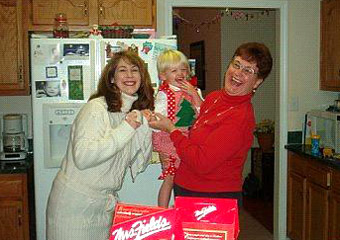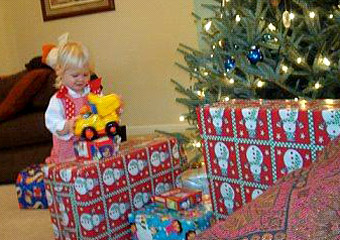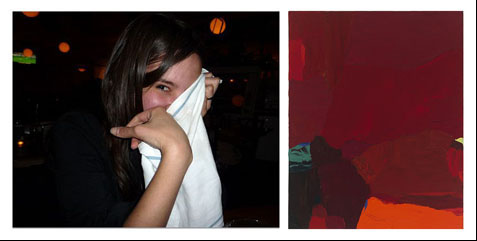Giving Up the Christmas Tree
Permanent link

Karen, learning that giving up the Christmas tree doesn’t mean giving up on family traditions
Even though by the age of 13 I had stopped believing in Jesus, I still went all-out every year to celebrate Christmas. I searched endlessly for the perfect tree, decorated my condo until it looked like a red and green bomb had exploded, and baked for days. I conveniently ignored the guilty feeling that I was going to hell for dispensing the holiday’s religious significance and instead focusing solely on the commercial aspects.
When, at the age of 28, I finally converted to Judaism after more than a decade of procrastination, I channeled my inner-Martha from Christmas to Chanukah. In the window, out went the tree, in the menorah. Egg nog was replaced with latkes (I figured equally fattening), and the green and red tacky Christmas decorations were exchanged for blue and silver tacky decorations. I even went as far as buying blue Chanukah hand towels for the bathroom. I was a woman on a mission.
I thought only of the fringe-benefits of the exchange such as the valuable closet space in my tiny condo I gained once all my Christmas decorations were given away. As for my husband, he was relieved that he would never again go through the drama of setting up a Christmas tree. I can still recall the terror on his face the first time he saw me with a saw in my hand, swearing like a drunk frat boy as I madly hacked away the Christmas tree trunk in a wretched attempt to get it to fit into its stand.
I told people that ‘giving up Christmas’ was no big deal, and I even bought that myself, until I called my mother to make arrangements to come home for the holiday. Instead of responding to my query with her usual detailed account of the tactical maneuvers it would take required to bring my dispersed family together on Christmas Day, my mother was surprised I was coming home. She had, in short, written me off for Christmas.
I was floored. “What makes you think that I wouldn’t come home this year?” I asked, part wounded, and part cross.
The response: silence. I could hear my father snoring on the other end of the phone in the background.
Finally, sounding thoroughly confused, she replied, “You’re, well, Jewish now. I thought you didn’t celebrate it anymore.”
Oh, yeah.
I realized at that moment that while I had focused on the superficial changes of the holiday season, I hadn’t thought about or discussed with my family how my religious choice would play out in family gatherings revolving around Christian traditions. I assumed nothing would change about the holiday except that it wouldn’t be in my home. My family assumed that it meant more Christmas ham for them.
Their assumption came from a good place. While they may have been disappointed that I would not be at the gathering, they had completely accepted my religious choice and weren’t about to make me take part of the Christian celebration of the birth of the Messiah. My mother, who wears various Christmas-themed sweaters from Thanksgiving through New Year’s, even sent me my first Chanukah menorah and 8 presents, one for each night, that year.
And I wondered if they might be right. Was I supposed to stop celebrating Christmas with my family? I couldn’t imagine not being there for the holiday, especially because living in different cities across the country, Christmas is the only time of year when my entire family gets together. It’s when we catch up on one another’s lives and laugh about the past. On the Christmas tree and throughout the house are the decorations we made as kids, evoking fond childhood memories. And, best of all, on Christmas morning I get to watch the sheer delight spread across my two young nieces’ faces as they open their gifts, as I vicariously relive my own childhood through them. I could not fathom no longer being a part of these precious family moments.

Karen's niece, enjoying Christmas with the Flayharts
I talked about it with my Rabbi and my Jewish husband, and ultimately concluded that what was most important was being with my family. Christmas wasn’t off-limits, in fact, it was healthier for me and my family dynamic that I continue to participate in their lives. Eating a Christmas meal or buying Christmas presents for my family doesn’t make me “less Jewish.” It makes me a member of the Flayhart family.
So, that Christmas and all the ones after, I travel to see my family, my arms loaded with Christmas presents and cookies. My husband looks forward to the annual opportunity to gorge himself on holiday sweets and play with my nieces. We give my family Christmas presents under the tree, and in exchange they give us presents wrapped in Chanukah paper. One year, during the annual family exchange, “Santa” – played by my uncle – gave us a Jewish cooking book. Ironically, each year Christmas brings me the best present of all: the love my family has for me and not just acceptance but support of my religious choice.
And, when Chanukah falls over Christmas, my family kindles the Menorah lights with us, and we play the Dreidel game with my nieces. What I’ve found is that each time my family participates in my newfound religion – whether it’s my wedding or Chanukah celebrations – it brings them closer to understanding not only Judaism, but who I am.
Looking back, I now realize that the reason I bought into the consumerism of the holidays stemmed from me being able to control the superficial aspects of a significant life change as I had not yet addressed the deeper ones. Now secure in my Jewish identity, I look forward to spending the holidays with my family each year, and I don’t feel any need to use my dreidel-decorated towels. And, more importantly, I’m no longer over-compensating for lacking a belief in the spiritual meaning of my holiday. My mother tells me that’s the best present I could have given her. This year, I vowed to find her a Chanukah sweater to wear.




.jpg)



